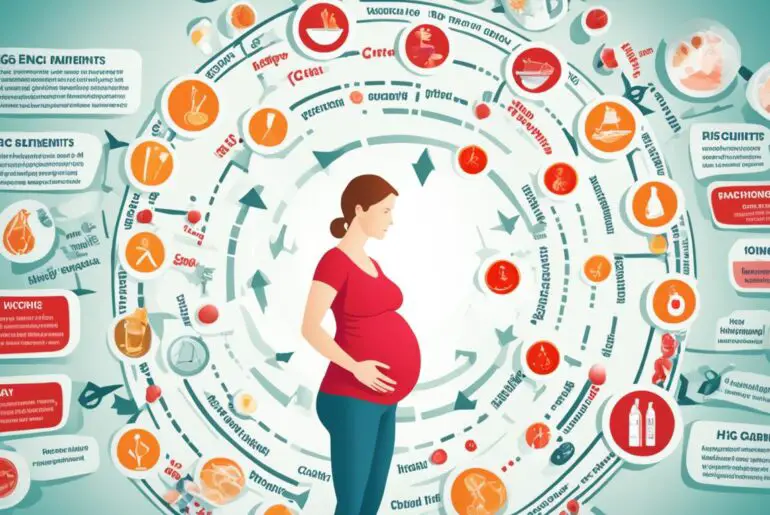Did you know that the HCG diet, a popular weight loss trend, is not recommended for expecting mothers? This surprising fact highlights an important concern for women who may be considering this diet during their pregnancy journey.
Key Takeaways:
- The HCG diet involves consuming only 500 calories per day and taking human chorionic gonadotropin (HCG) hormone injections.
- HCG is approved for fertility issues but is not recommended for weight loss during pregnancy due to safety concerns.
- Weight loss during pregnancy is not advisable, and it is important to prioritize a balanced diet providing sufficient nutrients for both the mother and the baby.
- Consulting with an OB/GYN is essential for comprehensive pregnancy care and advice on weight management.
- The weight loss on the HCG diet is primarily due to calorie restriction and not the hormone itself.
What is the HCG Diet?
The HCG diet is a weight loss program that involves a combination of a very low-calorie intake and the administration of human chorionic gonadotropin (HCG) hormone. The diet restricts the caloric intake to only 500 calories per day, which is significantly lower than the average calorie requirement for most individuals.
The HCG hormone, which is naturally produced by the placenta during pregnancy, is believed to help with weight loss by suppressing appetite and promoting the breakdown of stored fat. It is commonly used in medical settings to treat fertility issues.
However, it is important to note that the U.S. Food and Drug Administration (FDA) has deemed the use of HCG for weight loss purposes as unsafe and ineffective. Multiple studies have shown that any weight loss experienced on the HCG diet can be attributed to the extremely low-calorie intake rather than the hormone itself.
“The HCG diet has gained popularity in recent years, but it is essential to understand that the FDA has not approved it for weight loss. It is crucial to prioritize safe and healthy methods of weight management during pregnancy and beyond.”
If you are considering the HCG diet, it is recommended to consult with a healthcare professional, such as a registered dietitian or physician, to explore safe and effective alternatives that promote long-term, sustainable weight loss. They can provide personalized guidance based on your specific needs and goals.
| Pros of the HCG Diet | Cons of the HCG Diet |
|---|---|
|
|
Is the HCG Diet Safe?
Due to its potential risks and lack of scientific evidence supporting its efficacy, the HCG diet is not considered safe for weight loss. The restrictive nature of the diet, combined with the potential side effects of the hormone, can negatively impact both physical and mental well-being.
It is important to prioritize a well-rounded, balanced diet that provides all the essential nutrients for overall health and well-being. Instead of adopting extreme and potentially unsafe dieting practices like the HCG diet, it is recommended to focus on sustainable lifestyle changes and seek guidance from healthcare professionals for personalized advice and support.
HCG Diet Before Pregnancy
If you are considering the HCG diet, it is important to know that it is best done before trying to become pregnant. The HCG diet involves a low-calorie intake of only 500 calories per day, which may not provide sufficient nutrients for both the mother and the baby. This restricted calorie intake can be challenging for individuals who are trying to conceive or are already pregnant.
HCG therapy, which often includes HCG injections, is commonly recommended for women experiencing fertility issues. However, once pregnancy is confirmed, it is crucial to discontinue the HCG diet due to the potential adverse effects on the pregnancy. The low-calorie diet may not support the healthy development and growth of the fetus.
It is always advisable to prioritize a balanced diet that fulfills the nutritional needs of both the mother and the baby during pregnancy. Consulting with a healthcare professional, such as an obstetrician or a fertility specialist, is highly recommended when making decisions about diet and fertility treatments.
Additionally, it’s important to note that the HCG diet and fertility are complex issues with varying individual factors. Each person’s situation is unique, so it is best to seek personalized advice from a healthcare professional. They can provide guidance specific to your needs and help you make informed decisions about your fertility journey.
Key Points:
- The HCG diet is not recommended during pregnancy due to the potential adverse effects on the baby’s development.
- HCG therapy is often recommended for women experiencing fertility issues, but it should be discontinued once pregnant.
- Consulting with a healthcare professional is crucial for personalized advice and guidance on fertility treatments and diet during pregnancy.
| Pros of HCG Diet Before Pregnancy | Cons of HCG Diet Before Pregnancy |
|---|---|
|
|
Safety Concerns of the HCG Diet

The HCG diet has garnered significant attention as a weight loss method, but it is important to be aware of the safety concerns associated with this controversial diet. The Food and Drug Administration (FDA) has deemed the HCG diet as unsafe, citing potential risks and side effects.
One of the primary safety concerns of the HCG diet is the extremely low-calorie intake of only 500 calories per day. Such a severe calorie restriction can lead to various health issues, including nutrient deficiencies, muscle loss, and metabolic disturbance.
The use of HCG hormone injections is another cause for concern. While HCG is approved for fertility issues, it is not approved for weight loss. The FDA warns against using HCG products sold online, as these products are not regulated and may contain unknown ingredients that could be harmful.
Furthermore, individuals who follow the HCG diet may experience side effects such as headaches, depression, fatigue, irritability, and fluid retention. These side effects can significantly impact a person’s overall well-being and quality of life.
Consulting with a healthcare professional is crucial before considering the HCG diet. They can provide personalized advice, evaluate the potential risks, and guide individuals towards safer and more effective weight loss alternatives.
Quotes:
“The HCG diet has been flagged by the FDA due to safety concerns, particularly the extremely low-calorie intake and the use of unregulated HCG products.” – Dr. Jane Anderson, MD
Safety Concerns of the HCG Diet:
| Safety Concerns | Explanation |
|---|---|
| Extreme low-calorie intake | Consuming only 500 calories per day can lead to nutrient deficiencies, muscle loss, and metabolic disturbance. |
| Use of unregulated HCG products | HCG products sold online are not regulated by the FDA, posing potential risks due to unknown ingredients. |
| Side effects | Headaches, depression, fatigue, irritability, and fluid retention are common side effects of the HCG diet. |
It is crucial to prioritize safety and consult with healthcare professionals when considering any weight loss method, particularly those with potential risks and limited scientific evidence.
Alternatives to the HCG Diet for Weight Loss During Pregnancy
Weight loss during pregnancy is not advisable. It is crucial to focus on maintaining a balanced diet that provides sufficient nutrients for both the mother and the developing baby. Instead of the HCG diet, there are alternative approaches to support healthy weight management during pregnancy.
Here are some alternatives to the HCG diet for maintaining a healthy weight during pregnancy:
- 1. Balanced Diet: Adopting a balanced diet is essential for meeting the nutritional needs of both the mother and the baby. Ensure that the diet includes a variety of fruits, vegetables, whole grains, lean proteins, and healthy fats.
- 2. Portion Control: Practice portion control to avoid excessive calorie intake while still providing the necessary nutrients for proper growth and development.
- 3. Regular Exercise: Engage in prenatal exercises approved by your healthcare provider to support overall health and manage weight gain during pregnancy.
- 4. Hydration: Stay hydrated by drinking an adequate amount of water throughout the day to support digestion, nutrient absorption, and overall well-being.
- 5. Professional Guidance: Consult with a healthcare professional, such as an obstetrician or a registered dietitian, who can provide personalized guidance on healthy eating during pregnancy.
“It is important to prioritize the health and well-being of both the mother and the baby during pregnancy. Focus on nourishing your body with a well-rounded, nutrient-dense diet rather than resorting to extreme weight loss methods.”
Remember, weight loss during pregnancy is not the goal. The focus should be on maintaining a healthy lifestyle and providing the necessary nutrients for the mother and the baby’s well-being. Seek professional guidance to ensure a safe and healthy pregnancy journey.
OB/GYN Pregnancy Care and HCG Diet Advice

When it comes to pregnancy care, seeking the guidance of an OB/GYN is essential. These healthcare professionals specialize in providing comprehensive care for expectant mothers, ensuring the well-being of both the mother and the baby. In addition to regular check-ups and monitoring, OB/GYNs are a valuable source of advice on various aspects of pregnancy, including weight management and diet.
An OB/GYN can provide personalized guidance on weight gain during pregnancy, ensuring that it remains within a healthy range. They can also offer recommendations for maintaining a balanced diet that provides the necessary nutrients for the mother and the developing baby. Proper nutrition is crucial for the optimal health and development of the baby, and an OB/GYN can help in creating a meal plan that meets these needs.
Furthermore, if you have any concerns or questions about the HCG diet, consulting with your OB/GYN is highly recommended. They can provide you with accurate and evidence-based information regarding the potential risks and benefits of this diet during pregnancy. Your OB/GYN will consider your individual medical history and circumstances to provide you with the most appropriate and safe advice.
Remember, your OB/GYN is your partner throughout your pregnancy journey, and their expertise can contribute to a healthy and successful pregnancy. Don’t hesitate to reach out to them for guidance and support, especially when it comes to weight management and dietary choices. Your OB/GYN has your best interests and the well-being of your baby at heart.
The Science Behind the HCG Diet
The HCG diet has gained popularity for its promise of rapid weight loss. It combines a low-calorie intake with hCG hormone injections, with the goal of targeting stubborn fat stores. But what exactly is hCG and how does it contribute to weight loss?
What is hCG?
Human chorionic gonadotropin (hCG) is a hormone produced during pregnancy by the placenta. It plays a crucial role in supporting the growth and development of the fetus. In addition to its pregnancy-related functions, hCG has been used as a marker in home pregnancy tests.
The Role of hCG in the HCG Diet
The HCG diet involves injecting hCG hormone while following a strict 500-calorie-per-day meal plan. Proponents of the diet claim that the hormone helps promote weight loss by suppressing hunger, increasing metabolism, and targeting fat stores.
Scientific Studies and Findings
However, scientific studies have shown that weight loss on the HCG diet is primarily due to the calorie restriction rather than the hCG hormone itself. The restrictive nature of the diet leads to a significant caloric deficit, which promotes weight loss. The hormone is not proven to have any direct impact on weight loss.
In a controlled study published in the British Journal of Clinical Pharmacology, researchers compared participants following a 500-calorie diet with hCG injections to those following a 500-calorie diet with a placebo injection. The study found no significant difference in weight loss between the two groups, indicating that any weight loss experienced on the HCG diet is mainly attributed to the calorie restriction.
While the hCG diet may result in short-term weight loss, it is important to note that the severe calorie restriction can have negative effects on overall health and well-being. Consultation with a healthcare professional, such as a registered dietitian, is recommended before considering any drastic dietary changes.
The hCG hormone is produced during pregnancy and has been used as a marker in home pregnancy tests. The HCG diet combines a low-calorie intake with hCG hormone injections in an attempt to promote weight loss. However, scientific studies have shown that weight loss on the HCG diet is primarily due to the calorie restriction and not the hormone itself. It is important to prioritize a balanced and sustainable approach to weight loss rather than relying on drastic measures that may have potential adverse effects on health.
The Rules of the HCG Diet

The HCG diet follows a specific set of rules and guidelines to ensure optimal results. It is divided into three phases: the loading phase, the weight loss phase, and the maintenance phase.
Loading Phase
In the loading phase, individuals are encouraged to consume high-calorie, high-fat foods for two days. This helps to build up the body’s fat stores in preparation for the calorie-restricted phase. It is important to remember that this phase is temporary and should not be used as an excuse to indulge in unhealthy eating habits.
Weight Loss Phase
During the weight loss phase, individuals must strictly adhere to a calorie intake of only 500 calories per day. This requires careful meal planning and portion control. The diet typically consists of lean protein, vegetables, and fruits, with specific guidelines on portion sizes and food combinations. It is crucial to follow these guidelines closely to achieve the desired weight loss results.
In addition to the restricted calorie intake, it is important to stay hydrated by drinking plenty of water. Water helps to flush out toxins, aids in digestion, and can help curb hunger cravings. Aim to drink at least 8 cups of water per day.
Maintenance Phase
Once the desired weight loss is achieved, individuals enter the maintenance phase. In this phase, calorie intake is gradually increased, and additional food choices are introduced. The goal of this phase is to establish a new, healthy eating pattern and prevent weight regain. It is important to continue making nutritious food choices and maintaining an active lifestyle even after completing the HCG diet.
| Phase | Calorie Intake | Food Choices |
|---|---|---|
| Loading Phase | High-calorie, high-fat foods | Diverse food choices |
| Weight Loss Phase | 500 calories per day | Lean protein, vegetables, fruits |
| Maintenance Phase | Gradual calorie increase | Expanded food choices |
Following the rules of the HCG diet is essential to ensure success and optimize weight loss results. It is important to consult with a healthcare professional before starting any diet plan to ensure it is suitable for your individual needs.
Conclusion
When it comes to weight loss during pregnancy, the HCG diet is not the recommended approach. Instead, it is crucial to prioritize a balanced diet that provides the necessary nutrients for both the mother and the developing baby. Seeking professional guidance from healthcare professionals, such as OB/GYNs, is essential for safe and healthy weight management during pregnancy.
The HCG diet, with its low-calorie intake and hormone injections, poses safety concerns and is not approved by the FDA for weight loss purposes. It is associated with various side effects and may contain unknown ingredients when purchased online. As a result, it is crucial to consult with a healthcare professional before considering the HCG diet.
During pregnancy, the focus should be on fostering a healthy and nourishing environment for the baby. Healthcare professionals, especially OB/GYNs, can provide comprehensive care, including advice on weight gain, weight loss, and diet. They will guide expecting mothers toward appropriate and safe practices to ensure the well-being of both mother and baby.
FAQ
What is the HCG diet?
The HCG diet is a controversial diet that involves consuming only 500 calories per day and taking human chorionic gonadotropin (HCG) hormone injections.
Is the HCG diet safe for weight loss during pregnancy?
No, the HCG diet is not recommended for weight loss during pregnancy. It is important to prioritize a balanced diet and seek guidance from healthcare professionals, such as OB/GYNs, for safe and healthy weight management during pregnancy.
Can I follow the HCG diet before pregnancy?
If considering the HCG diet, it is best done before trying to become pregnant. The low-calorie intake may not provide sufficient nutrients for both the mother and the baby. HCG therapy is often recommended for women experiencing fertility issues, but it should be discontinued once pregnant due to the potential adverse effects on the pregnancy.
Are there safety concerns with the HCG diet?
Yes, the FDA has deemed the HCG diet unsafe for weight loss. It is associated with various side effects such as headaches, depression, and fatigue. Additionally, the use of HCG products sold online is not regulated and may contain unknown ingredients. It is recommended to consult with a healthcare professional before considering the HCG diet.
What are alternatives to the HCG diet for weight loss during pregnancy?
Weight loss during pregnancy is not advisable. Instead of the HCG diet, it is recommended to focus on a balanced diet that provides sufficient nutrients for both the mother and the developing baby. A healthcare professional can provide guidance on healthy eating during pregnancy.
What is the role of an OB/GYN in pregnancy care and HCG diet advice?
Seeking the guidance of an OB/GYN is essential during pregnancy. They can provide comprehensive care, including advice on weight gain, weight loss, and diet. If you have any concerns or questions about the HCG diet, consulting with an OB/GYN is recommended.
What is the science behind the HCG diet?
The hormone hCG is produced during pregnancy and has been used as a marker in home pregnancy tests. The HCG diet combines a low-calorie intake with hCG hormone injections. However, scientific studies have shown that weight loss on the HCG diet is primarily due to calorie restriction and not the hormone itself.
What are the rules of the HCG diet?
The HCG diet is divided into three phases: loading phase, weight loss phase, and maintenance phase. During the weight loss phase, individuals consume only 500 calories per day and follow specific meal plans. The diet restricts certain foods and encourages drinking water.
What is the recommended course of action for weight loss during pregnancy?
Weight loss during pregnancy is not advisable. It is important to prioritize a balanced diet and seek guidance from healthcare professionals, such as OB/GYNs, for safe and healthy weight management during pregnancy.




